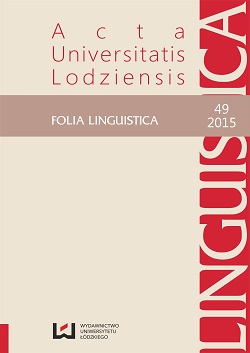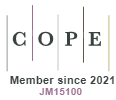About expressiveness in the David’s Psalter prayers by Mikołaj Rej
DOI:
https://doi.org/10.18778/0208-6077.49.06Keywords:
Mikołaj Rej, David’s Psalter, prayer, expressivenessAbstract
The article analyses the linguistic signs of expressiveness present in the prayers attached to the prose paraphrase of Mikołaj Rej’s David’s Psalter, in particular the evaluative (modality) and intensifying exponents. Rej’s prayers are characterized by a lot of emotionalisms which make them a tool of the emotional expression. The writer uses many expressional synonyms accumulated as two or three evaluative expressions and many epithets which perform the hyperbolic function and intensify the referent feature of the noun. Metaphors and rhetorical questions also serve the function of intensification. The expressiveness is also emphasizes by the use of the elements characteristic of the spoken language: the lexicon of the vernacular speech, a wide variety of phatic signals and demonstrative pronouns. The application of these linguistic phenomena makes Rej’s prayers, despite the structural limitations, assume the character of private confessions full of authentic affection and admiration of God – the addressee.
Downloads
References
Grzegorczykowa R., 1979, Struktura semantyczna wyrażeń ekspresywnych, w: M. Szymczak (red.), Z zagadnień słownictwa współczesnego języka polskiego, Wrocław.
Google Scholar
Grabias S., 1981, O ekspresywności języka. Ekspresja a słowotwórstwo, Lublin.
Google Scholar
Kowalska D., Kształt stylistyczny człowieczej rozmowy z Bogiem w modlitwach „Psałterza Dawidowego” Mikołaja Reja [w druku].
Google Scholar
Kowalska D., 2013, Sztuka słowa Mikołaja Reja. Studium stylistycznojęzykowe „Psałterza Dawidowego”, Łódź.
Google Scholar
DOI: https://doi.org/10.18778/7525-818-9
Kuraszkiewicz W., 1986a, Uwagi o języku Mikołaja Reja, w: tenże, Polski język literacki, Warszawa–Poznań, s. 609–622.
Google Scholar
Kuraszkiewicz W., 1986b, Przejawy leksykalizacji w „Postylli” Reja, w: tenże, Polski język literacki, Warszawa–Poznań, s. 623–630.
Google Scholar
Makuchowska M., 1998, Modlitwa jako gatunek języka religijnego, Opole.
Google Scholar
Pado W., 1964, Modlitwa w dziełach Mikołaja Reja, „Roczniki Humanistyczne” XII, z. 1, s. 99–131.
Google Scholar
Skubalanka T., 1995a, Ekspresywność języka a mowa potoczna, w: taż, O stylu poetyckim i innych stylach języka, Lublin, s. 68–71.
Google Scholar
Skubalanka T., 1995b, O ekspresywności języka, w: taż, O stylu poetyckim i innych stylach języka, Lublin, s. 59–67.
Google Scholar
Skubalanka T., 2000, Kategoria atrybutu a epitety stylistyczne, w: taż, Wprowadzenie do gramatyki stylistycznej języka polskiego, Lublin, s. 145–150.
Google Scholar
Welte B., 1995, Modlitwa jako mowa, „Znak” 47, nr 12, s. 18–32.
Google Scholar
Welte B., 1996, Filozofia religii, Kraków.
Google Scholar
Wojtak M., 1999a, Modlitwa ustalona – podstawowe wyznaczniki gatunku, w: J. Adamowski, S. Niebrzegowska (red.), W zwierciadle języka i kultury, Lublin, s. 129–138.
Google Scholar
Wojtak M., 1999b, Wyznaczniki gatunku wypowiedzi na przykładzie tekstów modlitewnych, „Stylistyka” 8, s. 107–108.
Google Scholar
Wojtak M., 2000, Modlitwa jako gatunek wypowiedzi, w: W. Książek-Bryłowa, H. Duda (red.), Język polski. Współczesność. Historia, Lublin, s. 133–141.
Google Scholar
Słownik polszczyzny XVI wieku, red. M. Mayenowa i in., t. I–XXXVI, Wrocław 1966–2012.
Google Scholar
Downloads
Published
How to Cite
Issue
Section
License

This work is licensed under a Creative Commons Attribution-NonCommercial-NoDerivatives 4.0 International License.










